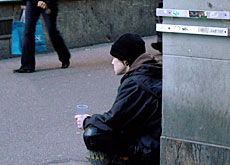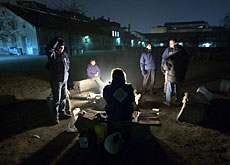More youngsters sink into poverty trap

The number of people receiving social benefits in Switzerland has increased again, with a growing proportion of youngsters dependent on help from the state.
The latest official figures added fuel to campaigns from pressure groups highlighting the worsening situation for under 18-year-olds who now make up almost a third of people on welfare assistance.
The Swiss Conference of Social Institutions believes the problem can no longer be ignored.
“We were talking about this issue months ago, but somehow it got brushed under the carpet. But the statistics now prove that there is a real problem,” the association’s president Walter Schmid told swissinfo.
The main issue is the lack of opportunities for young people to get work, he added.
Young adults aged between 18 and 25 years accounted for 4.5 per cent of welfare payments in 2005, with 70 per cent of these people having with no professional training. The Federal Statistics Office, which compiled the figures released on Tuesday, warned of a “lasting problem” with this age group.
Job market woes
“Some of them do have enough qualifications, but the market wants people with work experience, so young people don’t have a chance of getting a job. This is an absurd situation,” Schmid said.
Schmid called for new benefits for low-income families along with joint action from employers and education authorities to tackle the problem.
“This is not an issue that social welfare can solve alone,” he admitted.
A quarter of all people in Switzerland who depend on social welfare live in the country’s five biggest cities – Zurich, Geneva, Bern, Basel and Lausanne. This represents 5.3 per cent of the main urban centre population and 7.3 per cent of under-18s living in these areas.
Catholic charity Caritas estimates that 20,000 children live below the poverty line in canton Zurich, most of them within the city limits.
Zurich wealth gap
Last year the organisation opened a supermarket in one of the city’s most deprived areas offering cheap food and other essentials to those who could not afford normal prices. Caritas estimates that some 6.6 per cent of Zurich’s inhabitants rely on social hand-outs.
“Because Zurich is so rich it costs more to live here and this affects the poor proportionally more than in other parts of Switzerland,” Caritas supermarket manager Christina Jetzer told swissinfo at the time.
Zurich city authorities launched a low-paid job scheme in 2005 designed to get the long-term unemployed back into work. Following initial successes, it was announced last year that the number of positions would rise from 215 to 500 by 2009.
swissinfo, Matthew Allen
The Federal Statistics Office figures show that more than half of those people on welfare assistance claim benefits for more than a year. This figure drops to 15% for those relying on handouts for over four years.
Some 3.8% of all Swiss households receive state aid, more than half of which are single person households. Divorcees are also much more likely to be dependent on benefits than married couples.
A fifth of children that depend on welfare benefits come from single parent households and another fifth from households with three or more children.
A survey conducted by the gfs polling institute in Zurich in December last year revealed that most Swiss people are unhappy with the welfare system. Of 705 respondents, most judged the system as “bad” or “neither good or bad”, with an average score of 2.8 out of five (three being a neutral score).
Most were unhappy with disability benefits (that were tightened up to make it harder to claim hand-outs after a referendum earlier this month), while health insurance companies and unemployment benefits also got the thumbs down.
The state pension fund got higher scores, but those surveyed displayed little confidence that it would stay that way.
Some 65% wanted the welfare system revamped, funded by an assortment of sources from an increase in income tax, value added tax or a rise in death duties.

In compliance with the JTI standards
More: SWI swissinfo.ch certified by the Journalism Trust Initiative




You can find an overview of ongoing debates with our journalists here. Please join us!
If you want to start a conversation about a topic raised in this article or want to report factual errors, email us at english@swissinfo.ch.